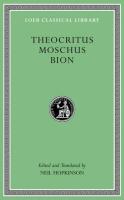
Harvard-Loeb (2015) h/b 590pp £19.95 (ISBN 9780674996441)
This welcome addition to the Loeb Library by the late Neil Hopkinson replaces the version—now more than a century old—by J. M. Edmonds. After an introduction which covers what little is known about the authors (we can at least date Theocritus to the 3rd century BC, though we cannot tell if Theocritus ‘invented’ pastoral poetry), H. goes on to take brief account of Later Pastoral, especially Virgil, but also (in England) Sidney, Spenser and Milton. A section on the Text reminds us that the manuscripts of Theocritus disagree between Ionic and Doric, and N. wisely concludes that it is not practicable to distinguish much about the poet’s principles (Gow [1952] was equally cautious). The MSS of Theocritius are numerous—over 180; for reports of their readings, H. bases his text on those of Gow and Gallavotti (1993). A useful and not unduly long Bibliography is broken down into sections, including Dialect, Meter and Pastoral, in addition to Hellenistic Poetry, Commentaries, and the Scholia.
The text of Theocritus is preceded by not especially helpful Testimonia, but including Servius on the importance of the bucolic diaeresis. Each Idyll is introduced separately (with a mini-bibliography, where relevant); there is also a very brief apparatus criticus. The Idylls in turn are followed by the (few) Fragments, and 25 Epigrams, all included in the Greek Anthology (see Gow and Page: The Greek Anthology: Hellenistic Epigrams [1965]). There follow Moschus, whose authorship of the well-known Lament for Bion is summarily dismissed by H. on chronological grounds—indeed, perhaps only two poems can be confidently ascribed to him—Bion, including the Lament for Adonis, the anonymous Adonis Dead in anacreontics,, a bucolic (papyrus) fragment of unknown authorship, and six ‘Pattern Poems’ (Technopaegnia). There is an Index of names.
H.’s translation is workmanlike: ‘literal enough to help those with some Greek to construe and understand the original, and also to provide a modestly idiomatic version for the Greekless’: there is occasional mild bowdlerisation. However, much of the merit of this compact volume lies in the notes, which, in H’s characteristic style, are brief, clear, relevant, and wholly admirable. H has an unerring eye for what is likely to hold up the non-specialist reader, be the problem historical, textual, linguistic, mythological or concerning Realien; there are not a few references to Homeric parallels. Of course, the notes do not supplant Gow’s commentary, but within a tight compass they fulfil a most useful role. The quality of the volumes in the Loeb Library has been improving now for many years, and this is an impressive example of that. Nor, at under £25 for over 600 pages, will the buyer feel short changed.
Colin Leach
[As ‘Willy’ Movits sang in 1905: Βωκολικαι μωσαι, σποραδες ποκα, νυν δ’hαμα πασαι,/ εντι μιας μανδρας. εντι μιας αγελας ]
